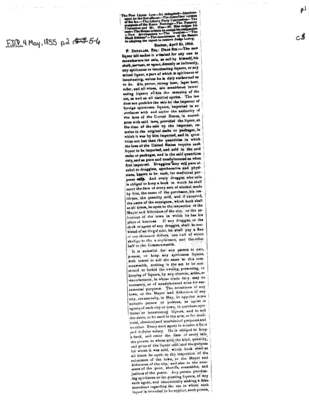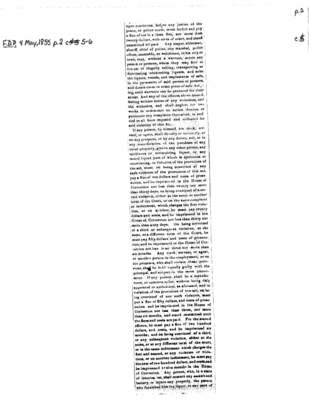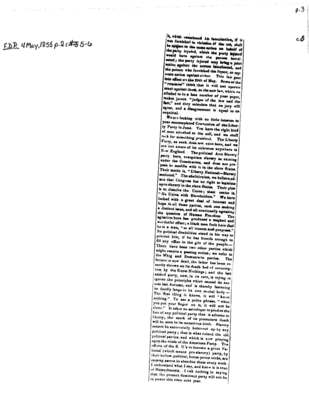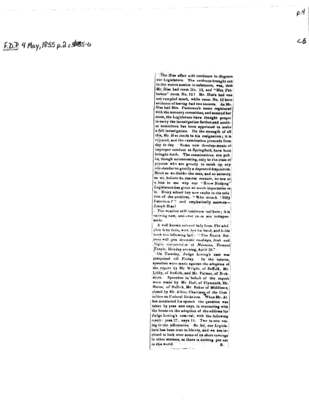Pages
D6775_Page_1
The New Liquor Law – Its extringency – Imprisonment for the first offense – The [illegible] opinion of the law – The Liberty Party Convention – The prospects of the Know Nothings – The Nunnery Committee and Mr. Hiss – Mr. Hiss resigns his seat – The House refuses to accept his resignation – New development's – The weather – "The Black Siddons" – The occurrance of the Senate in adopting the report to remove Judge Loring.
Boston, April 30, 1855.
F. Douglass, Esq: Dear Sir:–The new Liquor bill makes it criminal for any one to manufacture for sale, or sell by himself, his clerk, servant, or agent, directly or indirectly, any spiritiouse or intoxicating liquors, or any mixed liquor, a part of which is spiritious or intoxicating, unless he is duly authorized so to do. Ale, porter, strong beer, lager beer, cider, and all wines, are considered intoxicatin liquors within gthe meaning of the act, as weel as all distilled spirits. The law does not prohibit the sale by the importer of foreign spiritious liquors, imported in accordance with and under the authority of the laws of the United States, in accordance with said laws, provided the liquor, at the time of the sale by the importer, remains in the orginal casks or packages, in which it was by him imported, and in quanitties not less than the quantities in which the laws of the United States require such liquor to be imported, and sold in the said casks or packages, and in the said quantities only, and as pure and unadulterated as when first imported. Druggist may sell pure alcohol to druggists, apothecaries and physicians, known to be such, for medicinal purposes only. And every druggist who sells is boliged to keep a book in which he shall enter the date of every sale of alcohol made him, the name of the purchaser, his residence, the quantity sold, and if exported, the name of he consignee, which book shall at all times, be open to the inspection of the Mayor and Aldermen of the city, or the selectmen of the town in which he has his place of business. If any druggist, or the clerk or agent of any druggist, shall be convicted of an illegal sale, he shall pay a fine at one thousand dollars, one half of which shall go to the complainant, and the other half of the Commonwealth.
It is unlawful for any person to own, possess, or keep any spirituous liquors, with intent to sell the same in this commonwealth, nothing in the act to be construed to forbid the owning, possessing, or keeping of liquors, by any chemist, artist, or manufacturer, in whose trade they may be necessary, or of the unadluterated wine for sacremental purposes. The selectmen of any town, or the Mayor and Aldermen of any city, are annually, in May, to appoint some suitable person or persons, as agent or agents, of such city or town, to purchase spirituous or intoxicating liquor, and to sell the same, to be used in the arts, for medicinal, chemical, and mechanical purposes, and no other. Every such agent to receive a fixed and definite salary. He is obliged to keep a book, and enter the date of every sale, the person to whom sold, the kind, quantity, and price of the liquor sold, and the purpose for which it was sold, which book shall at all times be open to the inspection of the selectmen of the town, or the Mayor and Aldermen of the city, and also to the overseers of the poor, sheriffs, constables, and justices of the peace. Any person purchasing spirituous or intoxicating liquors, of any such agent, and intentionally making a false statement regarding the use of which such liquor is intended to be applied, such person,
D6775_Page_2
upon conviction before any justice of the peace, or police court, must forfeit and pay a find of not less than five, nor more than twenty dollars, with costs of court, and stand committed till paid. Any mayor, alderman, sheriff, chief of police, city marshal, police officer, constable, or watchman, in his city, or town, may, without a warrant, arrest any person or persons, whom they may find in the act of illegally selling, transporting or distributing intoxicating liquors, and seize the liquors, vessels, and implements of sale, in the posession of said person or persons, and detain them in some place of safe keeping, until warrants can be procured for their arrest. And any of the officers above named, having written notice of any violations, and the witnesses, and shall neglect for two weeks to commence an action thereon or prosecute any complaint thereafter, is entitled to all fines imposed and collected for said violation of this Ac[t].
If any perons, by himself, clerk, servant, or agent, shall directly or indirectly, or on any pretence, or by any device, sell, or in any consideration of the purchase of any other property, give to any other person, any spirituous or intoxicating liquor, or any mixed liquor part of which is spirituous or intoxicating, in violation of the provisions of the act, must on being convicted of any such violation of the provisions of this act, pay a fine of ten dollars and costs of prosecution, and be imprisoned in the Hours of Correction not less than twenty nor more than thirty days; on being convicted of a second violation, either at the same of another term of the Court, or on the same complaint or indictment, which charges the first violation, or on another he must pay twenty dollars and costs, and be imprisoned in the House of Correction not less than thirty nor more than sixty days. On being convicted of a third or subsequent violation, at the same, or a different term of the Court, he must pay fifty dollars and costs of prosecution, and be imprisoned in the House of Correction not less than three nore more than six months. Any clark, servant, or agent, or another person in the employment, or on the promises ,who shall violate these provisions, shall be held equally guilty with the principal and subject to the same punishment. If any person shall be a manufacturer, or common seller, without being duly appointed or authorized, as aforesaid, and in violation of the provisions of this act, on being convicted of one such violation, must pay a fine of fifty dollars, and costs of prosecution and be imprisoned in the House of Correction not less than three, nor more than sixth months, and stand committed until the fees and costs are paid. For the second offence, he must pay a fine of two hundred dollars, and costs, and be imprisoned six months; and on being convicted of a third, or any subsequent violations, either at the same, or at any different term of the court, or in the same indictment which charles the first and second , or any violation or violations, or on another indictmrnt, he must pay the sum of two hundred dollars, and costs and be imprisoned twelve months in the House of Correction. Any person, who, in a state of intoxication, shall commit any assult and battery, or injure any property, the person who furnished him the liquor, or any part of
D6775_Page_3
[illegible], which occaisoned his intoxication if it was furnished in violation of the act, shall be subject to the same action on behalf of the party injured, which the party injured would have against the person intoxicated; the party injured may bring a joint action against the person intoxicate, and the person who furnished the liquor, or separate actions against either. this law goes into effect on the 20th of May. Some of the "rummies" think that it will not operate much against them, as the new law, which we alluded to in a late number of your paper, makes jurors "judges of the law and the feet," and they calculate that no jury will agree, and disagreement is equal to an acquittal.
We are looking with no little interest to your contemplated Convention of the Liberal Party in June. You have the right kind of men attached to the call, and we shall look for something practical. The Liberty Party, as such, does not exist here, and we are not aware of its existence anywhere in New England. The political Anti Slavery party here, recognizes slavery as existing under the Constitution, and does not propose to meddle with it in the slave States. Their motto is, "Liberty National – Slavery sectional." The abolitionists, we believe, admit that Congress has no right to legislate upon slavery in the slave States. Their plan is to dissolve the Union; their motto is, "no Union with Slaveholders." We have looked with a great deal of interest and hope in all these parties, each one making a distinct issue, and all continually agitating the question of Human Freedom. The agitation here has produced a marked and wonderful effect; a black man feels that he is a man, "to all intents and purposes." No political diabilities stand in his way to prevent him, if he has friends enough to fill any office inthe gift of the people. – There have been two other parties which might receive a passing notice; we refer to the Whig and Democratic parties. The former is now dead, the latter has been recently thrown on its death bed of conumption by the Know Nothings; and the last named party, now, in its turn, is trying to ignore the principles which caused its success last Autumn, and is thereby fastoning its deadly fangs in its own mortal bady – The first thing it knows, it will "know nothing." To use a polite phrase, "when you put your finger on it, it will not be there." It takes no astrologer to predict the fate of any political party that is adverse to liberty, the mark of its premature death will be seen in its montrous birth. Slavery cannnot be successfully bolstered up by any political party; that is what ruined the old poltical parties, and which is not preying upon the vitals of gthe American Party. The efforts of the K.N's to become a great National (which means pro-slavery) party, by their hollow, political hocus-pocus tricks, are causing scores to abandon them every week. I understand what I say, and know it is true of Massachusetts. I rish nothing in saying that the present dominant party will not be in powere this time next year.
D6775_Page_4
The Hiss affair still continues to disgrace our Legislature. The evidence brought out in the secret session in substance, was that Mr. Hiss had room No. 1 and "Mrs. Patterson" room No. 12! Mr. Hiss's bed was not rumpled much, while room No. 12 bore evidence of having had two tenants. As Mr. Hiss and Mrs. Patterson's name registered with the nunnery committee, and secured her room, the Legislature have thought proper to carry the investigation further, and another committee has been apppointed to make a full investigation. On the strength of all this, Mr. Hiss sends in his resignation; it is rejected, and the examination proceeds from day to day. Some new development of improper conduct at Springfield, have been brought forth. The examinations are public, though uninteresting, only to the class of persons who are greedy to catch up any vile slander to gratify a depraved disposition. Much as we dislike the man, and so severly as we believe he derves censure, we are at a loss to see why our "Know Nothing: Legislature has given so much importance to it. Every school boy now exults in the solution of the problem, "Who struck billy Patterson!" and emphatically answeres – Joseph Hiss!
The weather still continues cool here; it is snowing now, and over coats are indispensable.
A well known colored lady from Philadelphia is on here, with her husband, and holds for the following bill: "The BLACK SIDDONS will give dramatic readings, Irish and Negro [illegible] at [illegible], Tremont Temple, Monday evening, April 30."
On Tuesday, Judge Loring's case was postponed till Friday. In the interim, speeches were made against the adoption of the report by Mr. Wright, of Suffolk, Mr. Libby, of Suffolk, and Mr. Palmer, of Berkshire. Speeches in behalf of the report were made by Mr. Hall of Plymouth, Mr. Maine, of Suffolk, Mr. Baker of Middlesex, closed by Mr. Albee, Chairman of the Committee on Federal Relations. When Mr. Albee concluded his speech the question was taken by yeas and nays, in concurring with the house on the adoption of the address for Judge Lorings removal, with the following result: yeas 27; nays 11. Two to one voting in the affirmative. So far, our Legislature hasw been true to liberty, and we are inclined to look over some of its short comings in other matters, as there is nothing per[f]ect in this world.
S.



